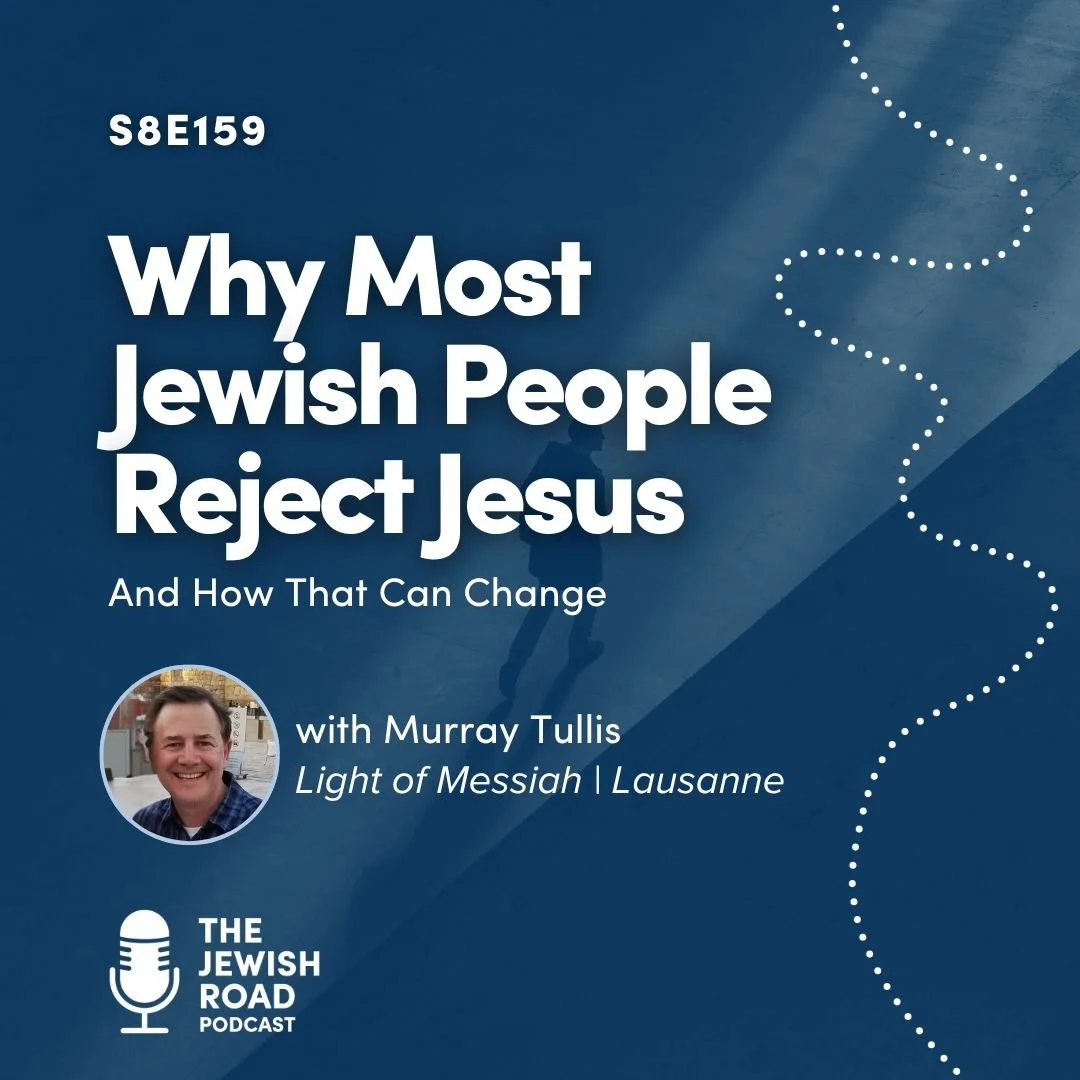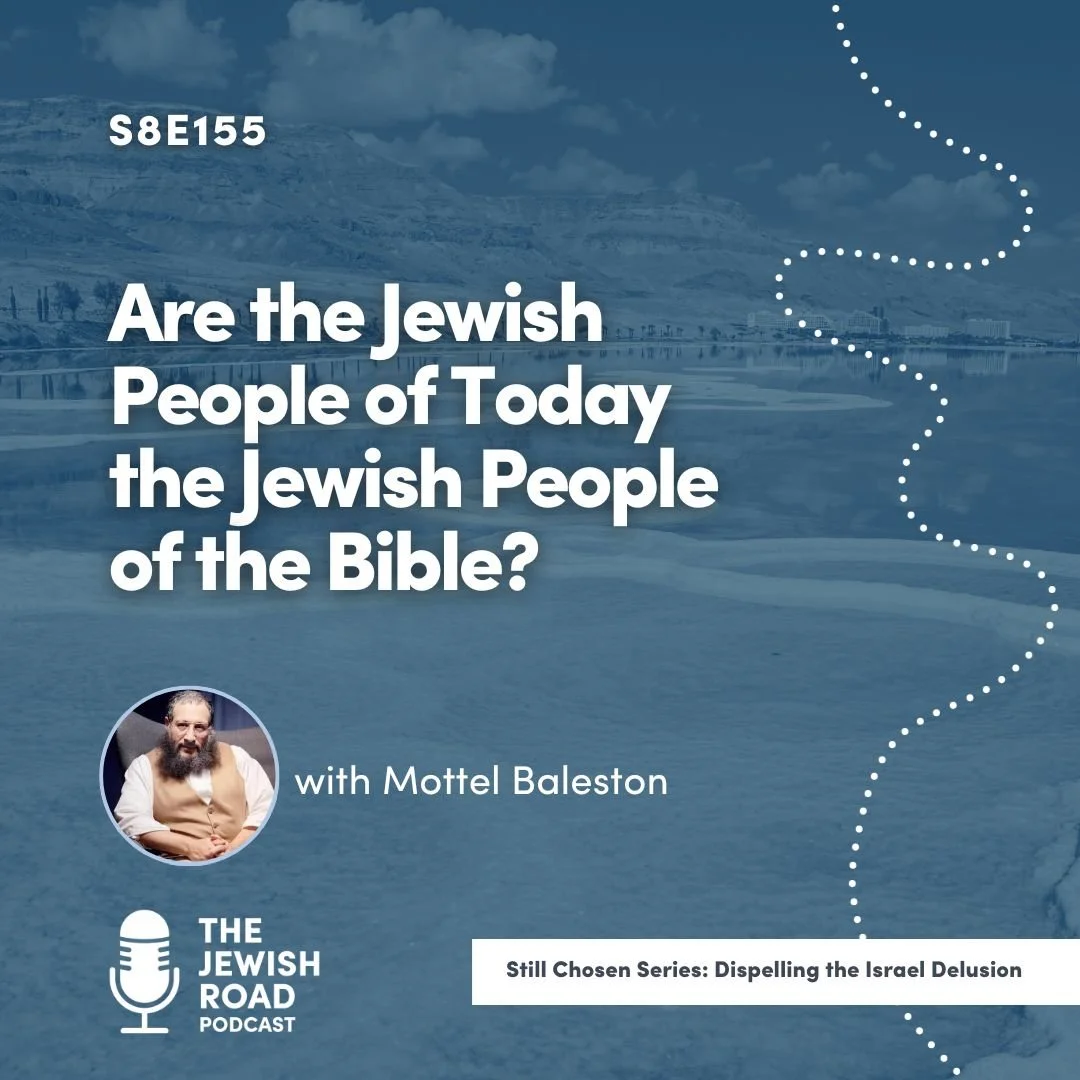Episode 161 - The Road Ahead for The Jewish Road
As 2025 draws to a close, we reflect on a year of challenge, recovery, and renewed calling.
In this special episode, we uncover the ancient story behind Hanukkah - and how it points to the greater miracle still to come.
From a dreidel in ancient Greece to divine doors opening in modern Israel, we explore how God’s covenant faithfulness continues to unfold before our eyes.
The Jewish Road is stepping into a new partnership with the government of Israel - helping tell her story to the nations and helping the church understand its part in that story.
Along the way, we share updates on health, hope, and the incredible ways God is still writing the story of His people.
Episode 160 - Did Jesus Celebrate Hanukkah?
Most people think of Hanukkah as the “Jewish Christmas,” a cultural celebration with candles, dreidels, and chocolate coins. But the real story is far older, far weightier, and far more connected to the story of Jesus than many Christians realize.
Hanukkah is a story about attempted erasure, courageous resistance, and God’s unstoppable commitment to preserve His covenant promises.
In this episode, we walk through the rise of Antiochus, the Seleucid king who sought not only to dominate Israel but to erase its identity - banning circumcision, outlawing Torah, desecrating the Temple, and demanding assimilation.
Yet when the majority gave way to cultural pressure, a few refused to bow. The Maccabees stood when others surrendered, preserving the line through which Messiah would one day come.
And 150 years later, during this very feast, Jesus walked in the Temple and declared Himself the Light of the World. The same God who preserved His people through the few stands faithful today.
Hanukkah isn’t merely history; it is a lens for understanding the spiritual battles of our own moment and the hope of the King who will come again.
Episode 159 - Why Most Jewish People Reject Jesus - And How That Can Change (featuring Murray Tullis)
For many Christians, the divide between the church and the Jewish people feels ancient and immovable. But every divide has a story - and far too often, it’s a story Christians never heard.
In this episode, we sit down with long-time friend and ministry leader Murray Tilles of Light of Messiah Ministries to uncover why Jesus remains such a point of pain for many Jewish families, and why the church’s calling toward Israel is more urgent than ever.
Murray shares his own journey from a deeply religious Jewish upbringing in North Carolina to the moment he prayed “in Jesus’ name” - words he never imagined he would say.
His story isn’t abstract.
It’s threaded with family tension, synagogue life, anti-Semitism, and the surprising power of Scripture to reshape identity. And it’s a window into the very real barriers Jewish people face when confronted with a “Christian” Jesus who feels historically disconnected from their people.
Together, we explore why the New Testament is far more Jewish than most Christians realize, why Paul’s “to the Jew first” mission still matters today, and how today’s rising anti-Semitism is creating unexpected openness among Jewish communities - if the church knows how to build trust.
Murray helps believers move from abstract support to real relational bridge-building, from sentiment to substance, from generic evangelism to meaningful connection rooted in God’s covenant faithfulness.
Episode 158 - How to Read News About Israel (featuring Nicole Jansezian)
In a world where Israel is headline news every day, most people are trying to interpret events through a fog of bias, misinformation, and instant reaction culture.
We sat down with longtime Jerusalem-based journalist Nicole Jansezian to ask a simple question that’s not simple at all:
How do we know what’s actually true?
What unfolded was an inside look at the fractured media landscape inside Israel and the ideological forces shaping the region.
Nicole helps us slow down and understand why the Middle East defies the easy categories most Westerners reach for.
Israel’s political divisions don’t map onto America’s left-right spectrum. Palestinian society is not monolithic. And both sides live with historic, cultural, and religious dynamics that rarely show up in the headlines.
When we oversimplify, we miss the deeper story - and the deeper human reality.
This conversation is for anyone who wants discernment in an age of propaganda. We explore why speed has replaced accuracy, why influencers often outrun truth, and why we need a long view shaped by Scripture, not by algorithms.
For Christians seeking to understand Israel, this isn’t just geopolitics - it’s about returning to the story God has been telling since Genesis and learning to see the world the way He sees it.
Episode 157 - Bringing Heaven Here (featuring Brad Gray & Brad Nelson)
Most of us learned the Lord’s Prayer before we understood what it was doing. It became a ritual, something recited rather than lived.
But when Jesus’ words are returned to their original world - the Jewish people under Roman rule, the long ache for redemption, the hope of a coming kingdom - the prayer opens up in ways most modern readers have never seen. It becomes less a mantra and more a mission.
In this conversation with Brad Gray and Brad Nelson of Walking the Text, we explore why context is not a luxury but a lifeline.
Jesus wasn’t offering a poetic devotional. He was giving His disciples a framework for partnering with God, joining the story that began in the Exodus, and learning to embody the kingdom He announced.
Every line reaches back to Israel’s history and forward to God’s future, shaping a people who would carry His reign into the world.
From the clash of kingdoms under Rome, to the Jewish practice of communal prayer, to the way the early disciples finally recognized the kingdom at Shavuot, this episode invites us to see the prayer not as ancient words but as a daily blueprint.
This is what it means to bring heaven here - to live as a people formed by the Father, trusting His provision, forgiving like He forgives, and resisting the powers that distort His world.
Episode 156 - Can I Critique Israel’s Government and Not Be Antisemitic?
Can you question what Israel’s government is doing and still stand with Israel in a biblical way?
Many Christians feel trapped between blind support on one side and hostility on the other. In a noisy moment filled with slogans and hot takes, the conversation needs more covenant, not less.
In this episode we step back into the big story of Scripture to separate three things most people blur together: Israel’s government, the Jewish people, and God’s eternal covenant.
We look at the prophets, at Jesus, at Paul, and at the Gospel of John to see how the Bible itself models sharp internal critique without ever erasing God’s promises to Israel.
You will come away with a simple “compass” you can use before you tweet, preach, repost, or debate.
The goal is not to tell you what to think about every policy, but to help you think inside the covenant story of God, so that your words carry truth, humility, and hope for both Israel and the nations.
Episode 155 - Are the Jewish People of Today the Jewish People of the Bible? (featuring Mottel Baleston)
There’s a rising chorus of voices - some hostile, others simply misinformed - claiming that modern Jews aren’t the same people God called His own in Scripture.
In this episode, we sit down with Messianic teacher Mottel Baleston to dismantle the Khazar conspiracy and explore the deeper theological question behind it: Are the Jewish people of today truly the covenant people of Abraham, Isaac, and Jacob?
Baleston traces the Jewish story through Scripture, history, and even modern genetics to show that God’s promises have never been revoked.
The Jewish people remain central to His plan of redemption, not as spiritual relics, but as living proof that God keeps His word.
This isn’t just about disproving bad history - it’s about recovering biblical clarity for the Church and real love for Israel.
Episode 154 - Why Is Israel Back in the Land if They Don’t Believe? (featuring Stephen Briggs)
Why would God restore Israel to the Land if they don’t believe in Jesus? That’s the question many Christians wrestle with - and the one Ezekiel 36 answers head-on.
In this wide-ranging conversation with filmmaker and Bible teacher Stephen Briggs of Hatikva Films, we explore the prophetic timeline of Israel’s restoration, the continuity of God’s covenant with Abraham, and the flaws in replacement theology that blur the story of Scripture.
Together we trace how the Hebrew nuances of Genesis 12, the promises of Ezekiel 36, and the disciples’ question in Acts 1 all reveal the same truth: God’s faithfulness comes before Israel’s faith.
Stephen shares insights from life in Jerusalem, stories from the “Blessing, Curse, or Coincidence” film series, and a clear-eyed view of what God is doing in our generation.
Whether we’re talking about prophecy, politics, or discipleship, the message is the same - the restoration of Israel is the greatest evidence that God keeps His promises.
Episode 153 - Will “All Israel” Be Saved? (featuring Dr. Michael Brown)
Why did Paul end his masterpiece in Romans with a promise that “all Israel will be saved”? What does that mean - and has it already happened, or is it still to come?
In this wide-ranging conversation with Dr. Michael Brown, author of Our Hands Are Stained with Blood and host of The Line of Fire, we trace how Romans 9–11 reveals the continuity of God’s plan for Israel and the nations.
Dr. Brown unpacks Paul’s argument verse by verse, explains why replacement theology opened the door to antisemitism in church history, and clarifies how “all Israel” refers to a future national turning to Messiah - not merely a cumulative remnant.
We also talk about the surge of antisemitism after October 7, the confusion in the modern church, and why believers must recover a biblical vision of Israel’s role in redemptive history. This isn’t a side issue. It’s the center of the gospel’s story of mercy.
Episode 152 - Still Chosen: Has One Verse Erased God’s Covenant?
For centuries, a single line from Paul’s letter to the Romans - “not all Israel is Israel” - has been used to rewrite the story of God’s faithfulness.
But was Paul really declaring that the Church replaced Israel? Or was he weeping over his people, trusting that God’s promises still stand?
This episode takes a deep look into Romans 9–11 and Galatians 6, unpacking what Paul meant by “the Israel of God” and how a single mistranslated conjunction has shaped two millennia of confusion.
We’ll explore the grief behind Paul’s words, the endurance of God’s covenants, and the modern drift that has led Christians to read prophecy as poetry and Israel’s story as metaphor.
As anti-Semitism rises and theology grows foggy, it’s time to recover what the Apostle Paul never meant to erase: that Israel’s unbelief doesn’t cancel God’s faithfulness - it magnifies it.
Episode 151 - Transformed by the Messiah (featuring Rabbi Jason Sobel)
Many of us read the Bible like a standard-definition broadcast - true, but flat. What happens when the Old and New Testaments come into the same frame? Clarity. Color. Coherence.
Rabbi Jason Sobel shares his journey to Messiah and why reconnecting the Testaments guards us from “strange fruit” - detached doctrines and confused practices. He walks through Sukkot, the Transfiguration’s “booths,” and how Yeshua’s Jewish context changes everything.
We also enter the present moment: Israel after Oct 7, Simchat Torah timing, and the difference between flimsy roofs we build and the sukkah God provides. Then we land where transformation begins - practices that move insight into life.
Episode 150 - Bearing Witness to the October 7 Massacre (featuring Justin Kron & David Boskey)
When evil boasts, truth must bear witness. After a screening of October 7: Bearing Witness to the Massacre at Lexington’s historic Lyric Theater, we sat down with co-creator, Justin Kron, and Israeli believer, David Boskey, for an unfiltered Q&A. The conversation traces the long arc leading to October 7, why the online narrative flipped overnight, and how followers of Jesus should respond without naïveté or despair.
We talk about the spiritual war beneath the politics, the cost of telling the truth, and the aching question of hostages still in captivity. We explore how trauma can open doors for real hope, and why any durable “peace plan” must deal with ideology and spiritual warfare, not just borders.
Finally, we get practical: where to find reliable info, how to disciple the next generation against propaganda, and why churches must speak with clarity. We end with an invitation to pray, to gather, and to stand with Israel in a way that honors Messiah and blesses the nations.
Episode 149 - Hebrew: The Language That Refused to Die (featuring Melissa Briggs)
We don’t know the problem we have: reading the Bible at the surface. English translations are trustworthy, but they flatten words that Hebrew infused with density, imagery, and connection. We end up missing layers of meaning that would transform how we live.
In this conversation, we explore what happens when Hebrew cracks open the text.
Familiar words you thought you understood suddenly leap off the page. Hope is sturdier, love is covenantal, fear is reframed, faith is embodied. The story of God’s promises comes alive in a way that makes you want to keep digging.
This isn’t about becoming a scholar. It’s about recognizing that the Bible is one unified story and learning how the Hebrew underneath points us more deeply to the God who keeps His promises and to the Messiah who fulfills them.
Episode 148 - Still Chosen: How Paul Welcomes the Nations Without Erasing The Jews
Galatians 3 has done a lot of heavy lifting in modern theology. Some say it proves everything is now “spiritual,” that Israel was folded into the church and the land promise dissolved. We open the text and ask: is that what Paul actually says?
Paul’s concern is rescue, not replacement. He confronts the claim that Gentiles need the works of the law to belong. By returning to Abraham, he shows that righteousness has always been by faith and that the blessing promised to the nations reaches its center in the Messiah. That’s inclusion without erasure.
Episode 147 - Still Chosen: Did God Make an Unconditional Covenant With Abraham?
The question of Israel’s chosenness isn’t abstract - it’s foundational.
If God’s covenant with Abraham is conditional, then Israel’s future and even our own assurance in Christ are uncertain. But if it’s unconditional, then God’s faithfulness to Abraham secures hope for us all.
In this episode, Ron and Matt Davis trace the Abrahamic covenant from Genesis 12, 15, and 17. They unpack the ancient covenant-cutting ceremony, the unconditional nature of God’s promise, and how the Mosaic covenant fits alongside it.
They also show how the New Testament reaffirms - not erases - God’s oath to Abraham, and why that matters for both Jews and Gentiles today.
With analogies of trust funds and house rules, they bring clarity to common misunderstandings. God’s covenant stands not because of human performance but because of His promise. And that means His faithfulness to Israel is the same faithfulness we depend on in Jesus.















